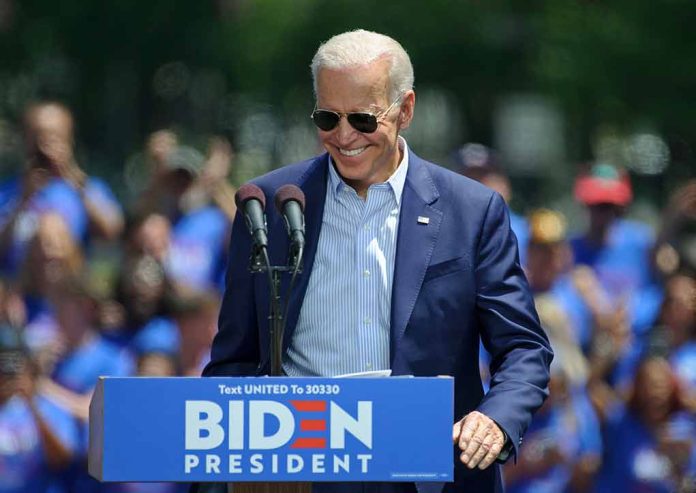
President Biden’s strategic use of an antiquated law could forever alter the landscape of oil drilling on federal waters.
At a Glance
- Biden plans a permanent ban on oil drilling in federal waters.
- The ban is based on the Outer Continental Shelf Lands Act of 1953.
- This move strengthens legal ground, making future reversals harder.
- Significant implications exist for environmental policy and energy companies.
Utilizing Historical Legislation
President Biden plans to permanently ban new oil drilling in extensive sections of the Atlantic and Pacific Oceans. This decision leverages the Outer Continental Shelf Lands Act of 1953. By employing this statute, the administration seeks to create an environmental policy that is difficult to overturn through purely executive measures. This law allows the president to withdraw federal waters from future oil and gas leasing. Hooking the policy to such robust historical legislation creates a fortified legal front for the ban.
This decision represents a strategic effort to ensure that environmental protection policy endures through inevitable political transitions. The administration’s use of the 1953 law underscores a commitment to durable environmental governance. This legislation-based approach signifies a cautious planning model aimed to withstand changes at the executive level while implicitly urging Congress to take action to revoke such bans.
Pres. Biden is expected to permanently ban new oil and gas drilling in large sections of the Atlantic and Pacific oceans, as well as other federal waters. The move relies on a law that could make it difficult for the Trump administration to reverse it.https://t.co/okSfgVnDlN
— Victor Narro (@NarroVictor) January 3, 2025
Impact on Energy and Environment
The plan for a permanent leasing ban in federal waters could signify a key victory for environmental advocates. Greenhouse gas emissions and climate change concerns would be addressed significantly through this measure. By focusing on reducing federal land leasing, which contributes substantially to U.S. greenhouse gas emissions, the Biden administration aligns with its broader climate goals. Additionally, companies that rely heavily on stockpiled leases may face operational challenges as new wells are needed to replace dwindling production.
“President Biden is expected to permanently ban new oil and gas drilling in large sections of the Atlantic and Pacific oceans, as well as other federal waters, in a way that could be difficult for the Trump administration to unwind, according to two people familiar with the plans.”
This initiative reflects the administration’s resolve to mitigate climate change by pursuing aggressive transitions towards renewable energy sources. Renowned for its punitive environmental stance, the federal government earns $4.2 billion in royalties—a significant income source, especially for states like New Mexico. This move may invite economic challenges for local economies heavily dependent on oil revenue.
— Parler (@parler_social) January 2, 2025
Legal Precedents and Challenges
The recent action follows precedents in administration history. In a move mirroring President Obama’s ban on offshore drilling in parts of the Arctic and Atlantic Oceans, Biden’s decision aligns with previous executive strategies supported by court rulings that such bans could not easily be undone by future administrations without Congressional involvement. This reflects a critical understanding of the legal landscape surrounding federal lands and waters and reinforces the legitimacy of executive authority in environmental protection.
“Mr. Biden intends to invoke an obscure provision of a 1953 law, the Outer Continental Shelf Lands Act, that would give him wide latitude to withdraw federal waters from future oil and gas leasing, said the people.”
This approach has raised questions about the legality and feasibility of enforcing a permanent ban. However, federal governance on energy resources continues to face scrutiny as the debate over climate change intensifies. Provisions like raising bond requirements and streamlining the bad-actor provisions suggest strategic preparedness for supporting sustainable practices that span multiple governmental administrations.
Sources
1. The Ins and Outs of Biden’s Federal Leasing Oil Ban
2. Biden Expected to Permanently Ban Oil Drilling in Some Federal Waters




